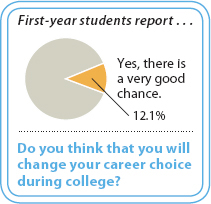Introduction with Student Profile
| 15 | Majors and Careers |
IN THIS CHAPTER YOU WILL EXPLORE
The more I learn about myself, and the more exploration I do, the more refined my decision making becomes.
Tia Roy, 19
Psychology major, Interpersonal Communications minor
Merrimack College
Tia Roy grew up in Haverhill, Massachusetts, and attended a vocational high school to explore hands-on technical trades with a specific attraction toward child care and health occupations. Tia graduated as a certified nursing assistant in the state of Massachusetts. While in high school, she worked two part-time jobs and was also president of her class, president of the Key Club, and an active member in several organizations, such as the National Vocational Technical Honor Society, Skills USA, and drama. Her parents instilled in her the values of hard work and dedication, and, more important, the expectation of being the first in her family to attend college.
Knowing that she would have to commute, Tia applied to four colleges, all within a 30-mile radius of her home. Her parents, although emotionally supportive, were unable to provide financial or knowledge support on the college process. If Tia was going to be successful, she would have to find her own way. “Being told I needed to pay for my college education all by myself was a real shock,” she says. “I basically was forced to grow up overnight. I realized that working harder than ever was no longer a choice but a necessity. I knew if I was truly going to be the first in my family to go to college, I was on my own.”
When Tia is not in class or studying, she splits her time between working as a peer adviser, waiting tables, and independent family care giving. “Being a commuter student, juggling academics, family, and three part-time jobs is definitely difficult,” says Tia. “It is hard to explain to my parents that sometimes finishing a ten-page paper takes precedence over contributing to Sunday morning house cleaning. They didn’t go to college. They don’t understand. Making it all work—holding all of this responsibility on my shoulders—is difficult but important. I understand myself as a first-generation college student better now in that I have unique challenges associated with the college experience.”

Tia entered Merrimack College as an undeclared first-year student, unsure of what she wanted to study but knowing that eventually she wanted to work with those suffering from intellectual and developmental disabilities. “I am so grateful to have had such a nontraditional high school experience because I was able to immerse myself as a professional in the workforce earlier than my peers. At sixteen, I was working in a facility through the cooperative education program, supporting twelve adults with various developmental disabilities. I believe this has allowed me to have a clearer understanding of my postcollege career goals as well as giving me a greater appreciation for what college has to offer,” she explains. Now in her sophomore year, Tia has decided to major in psychology and minor in interpersonal communications. “I’ve changed my major twice since coming to Merrimack,” she says. “The more I learn about myself, and the more exploration I do, the more refined my decision making becomes. I’ve settled on psychology because I believe it will provide me with a foundation on which to build my education and experiences.”
Your decision to attend college enhances your possibilities for employment and will likely contribute to a satisfying career path. College is a time not only for gaining academic knowledge but also for understanding who you are as a person, exploring all the available opportunities, being exposed to diverse thought and cultures, and growing from a student to a contributing member of our global economy.

Some students come to college with clear direction, firm knowledge of what major they want to study, and awareness of their likely career path. Others, like Tia, enter college undecided, understanding that their exposure to diverse subject matter will help solidify their academic choice. Still others enter with a declared major but are not certain how this course of study translates to the world of work. Each of these scenarios is normal. According to research from Pennsylvania State University, 80 percent of entering college students are not certain about their major regardless of their decision to declare a major, and 50 percent of students change their major at least once. Participating in co-curricular activities, such as joining a club or working part-time, helps solidify some decision making and allows you to learn a bit more about yourself in the process. Students who make connections between what they learn inside the classroom and what they learn outside have a more profound and satisfying college experience than those who do not. In this chapter you will learn how self-exploration influences the career decision-making process as well as helpful tips and resources available to prepare you for your career exploration in college and beyond.